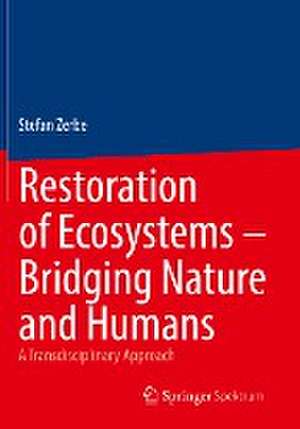Restoration of Ecosystems – Bridging Nature and Humans: A Transdisciplinary Approach
Autor Stefan Zerbeen Limba Engleză Paperback – 16 feb 2024
| Toate formatele și edițiile | Preț | Express |
|---|---|---|
| Paperback (1) | 752.88 lei 6-8 săpt. | |
| Springer Berlin, Heidelberg – 16 feb 2024 | 752.88 lei 6-8 săpt. | |
| Hardback (1) | 898.89 lei 39-44 zile | |
| Springer Berlin, Heidelberg – 15 feb 2023 | 898.89 lei 39-44 zile |
Preț: 752.88 lei
Preț vechi: 918.15 lei
-18% Nou
Puncte Express: 1129
Preț estimativ în valută:
144.07€ • 149.44$ • 120.13£
144.07€ • 149.44$ • 120.13£
Carte tipărită la comandă
Livrare economică 27 martie-10 aprilie
Preluare comenzi: 021 569.72.76
Specificații
ISBN-13: 9783662656600
ISBN-10: 3662656604
Pagini: 723
Ilustrații: XXI, 723 p.
Dimensiuni: 168 x 240 mm
Greutate: 1.17 kg
Ediția:1st ed. 2023
Editura: Springer Berlin, Heidelberg
Colecția Springer Spektrum
Locul publicării:Berlin, Heidelberg, Germany
ISBN-10: 3662656604
Pagini: 723
Ilustrații: XXI, 723 p.
Dimensiuni: 168 x 240 mm
Greutate: 1.17 kg
Ediția:1st ed. 2023
Editura: Springer Berlin, Heidelberg
Colecția Springer Spektrum
Locul publicării:Berlin, Heidelberg, Germany
Cuprins
Introduction to Restoration Ecology - Which habitat should be restored? Reference ecosystems for restoration.- Measures for ecosystem restoration.- Reintroduction of plant and animal species.- For dealing with non-native species in ecosystem restoration.- Monitoring and success control.- Forests.- Moors.- Subalpine and alpine grasslands.- Running waters.- Natural and anthropogenic still waters - Ecosystems and types of use influenced by salt - Marine habitats in the North Sea and Baltic Sea - Heath in the lowlands and mountains - Meadows and pastures in mesophilic, moist and calcareous locations - Lean or dry sand grasslands of the coasts and des Inland areas - Fields - Traditional agroforestry systems - Urban ecosystems - Mining or open pit sites and landfills.
Notă biografică
Stefan Zerbe is a landscape ecologist and teaches and researches at the Free University of Bozen in South Tyrol. He is particularly interested in restoration ecology and building interdisciplinary bridges between the natural and social sciences. Against this background, he has also designed and managed two international master’s degree programs. Numerous regional as well as international and interdisciplinary research projects and collaborations on a national and international level have resulted in over 250 scientific publications, book chapters and monographs. Both basic research and practical aspects of ecosystem restoration form a focus.
Textul de pe ultima copertă
Bridging the natural and social sciences, this cross-disciplinary textbook comprehensively presents both the scientific basis of restoration ecology and practical aspects of ecosystem restoration. In doing so, it highlights the diversity of land-use types with a focus on Central Europe and presents case studies of practical restoration projects. The textbook provides a profound and up-to-date, but also critical overview of the state of knowledge for students dealing with the environment, scientists as well as practitioners. This book opens up the broad spectrum of degraded ecosystems of Central European natural and cultural landscapes. In further chapters, marine ecosystems and their restoration as well as development potentials but also limitations of ecosystem restoration are discussed in more detail. The ecological basics are extended by an interdisciplinary perspective taking into account environmental ethics, sociology, anthropology and economics. In addition toproviding an up-to-date overview of the various fields and areas of activity in restoration ecology and ecosystem restoration, this textbook offers a valuable foundation for science, study and practice. Readers will also receive guidance on literature searches and critical fact analysis, and instructors on teaching in Higher Education and interdisciplinary approaches to discussions in restoration ecology.
The author
Stefan Zerbe is a landscape ecologist and teacher and researcher at the Free University of Bozen-Bolzano in South Tyrol (Italy). He is particularly interested in restoration ecology and building interdisciplinary bridges between the natural and social sciences. Against this background, he was in charge of developing and managing two international master’s programs.
The author
Stefan Zerbe is a landscape ecologist and teacher and researcher at the Free University of Bozen-Bolzano in South Tyrol (Italy). He is particularly interested in restoration ecology and building interdisciplinary bridges between the natural and social sciences. Against this background, he was in charge of developing and managing two international master’s programs.
The translation was done with the help of artificial intelligence (machine translation by the service DeepL.com). A subsequent intense human revision was done primarily in terms of scientific terms, style and content so that the book will read stylistically differently from a conventional translation. Springer Nature works continuously to further the development of tools for the production of books and on the related technologies to support the authors
Caracteristici
Provides a comprehensive overview of the topic of restoration ecology In addition to practical aspects, it also illuminates the anthropogenic influences Explains in detail various types of landscape in Central Europe and the Alps
